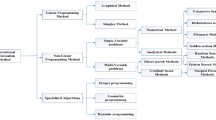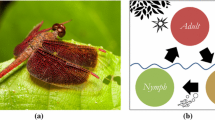Abstract
This paper proposes a novel binary particle swarm optimization algorithm (called IRBPSO) to address high-dimensional knapsack problems in dynamic environments (DKPs). The IRBPSO integrates an immune-based response strategy into the basic binary particle swarm optimization algorithm for improving the quantity of evolutional particles in high-dimensional decision space. In order to enhance the convergence speed of the IRBPSO in the current environment, the particles with high fitness values are cloned and mutated. In addition, an external archive is designed to store the elite from the current generation. To maintain the diversity of elites in the external archive, the elite of current generation will replace the worst one in the external archive if and only if it differs from any of the existing particles in the external archive based on the Hamming distance measurement when the archive is due to update. In this way, the external archive can store diversiform elites for previous environments as much as possible, and so as to the stored elites are utilized to transfer historical information to new environment for assisting to solve the new optimization problem. Moreover, the environmental reaction scheme is also investigated in order to improve the ability of adapting to different kinds of dynamic environments. Experimental results on a series of DKPs with different randomly generated data sets indicate that the IRBPSO can faster track the changing environments and manifest superior statistical performance, when compared with peer optimization algorithms.



Similar content being viewed by others
Data Availability Statement
No data were used to support this study.
References
Baykasoǧlu A, Ozsoydan FB (2018) Dynamic scheduling of parallel heat treatment furnaces: a case study at a manufacturing system. J Manuf Syst 46(4):152–162
Alrashidi MR, El-Hawary ME (2009) A survey of particle swarm optimization applications in electric power systems. IEEE Trans Evol Comput 13(4):913–918
Baker BM, Ayechew MA (2003) A genetic algorithm for the vehicle routing problem. Comput Oper Res 30(5):787–800
Bansal JC, Deep K (2012) A modified binary particle swarm optimization for knapsack problems. Appl Math Comput 218(22):11,042–11,061
Basu SK, Bhatia AK (2006) A naive genetic approach for non-stationary constrained problems. Soft Comput 10(2):152–162
Baykasoǧlu A, Ozsoydan FB (2014) An improved firefly algorithm for solving dynamic multidimensional knapsack problems. Expert Syst Appl 41(8):3712–3725
Baykasoǧlu A, Ozsoydan FB (2016a) . A constructive search algorithm for combinatorial dynamic optimization problems. 1:3712–3725. https://doi.org/10.1109/EAIS.2015.7368783
Baykasoǧlu A, Ozsoydan FB (2016b) An improved approach for determination of index positions on CNC magazines with cutting tool duplications by integrating shortest path algorithm. Int J Prod Res 56(3):742–760
Baykasoǧlu A, Ozsoydan FB (2017) Evolutionary and population-based methods versus constructive search strategies in dynamic combinatorial optimization. Inf Sci 420(12):159–183
Baykasoǧlu A, Ozsoydan FB (2018a) Dynamic optimization in binary search spaces via weighted superposition attraction algorithm. Expert Syst Appl 96(4):157–174
Baykasoǧlu A, Ozsoydan FB (2018b) Minimisation of non-machining times in operating automatic tool changers of machine tools under dynamic operating conditions. Int J Prod Res 56(4):1548–1564
Blado D, Toriello A (2019) Relaxation analysis for the dynamic knapsack problem with stochastic item size. Oper Res 29(1):1–30
Calderín JF, Masegosa AD, Pelta DA (2015) An improved genetic algorithm based approach to solve constrained knapsack problem in fuzzy environment. Int J Comput Intell Syst 8(4):667–689
Chang RI, Hsu HM, Lin SY, Chang CC, Ho JM (2017) Query-based learning for dynamic particle swarm optimization. IEEE Access 5(99):7648–7658
Cobb HG, Grefenstette JJ (1993) Genetic algorithms for tracking changing environments. In: 5th International conference on genetic algorithms, pp 523–530
Cruz C, González JR, Pelta DA (2011) Optimization in dynamic environments: a survey on problems, methods and measures. Soft Comput 15(7):1427–1448
Eberhart R, Kennedy J (2002) A new optimizer using particle swarm theory. In: Proceedings of the 6th international symposium on micro machine and human science (MHS’95), pp 39–43
Fan SKS, Lin Y, Fan CM, Wang YY (2009) Process identification using a new component analysis model and particle swarm optimization. Chemom Intell Lab Syst 99(1):19–29
Feng Y, Wang GG, Wang L (2017) Solving randomized time-varying knapsack problems by a novel global firefly algorithm. Eng Comput 3:1–15
Fong S, Wong R, Vasilakos AV (2016) Accelerated pso swarm search feature selection for data stream mining big data. IEEE Trans Serv Comput 9(1):33–45
Hu W, Yen GG (2015) Adaptive multiobjective particle swarm optimization based on parallel cell coordinate system. IEEE Trans Evol Comput 19(1):1–18
Jian W, Xue YC, Qian JX (2004) An improved particle swarm optimization algorithm with neighborhoods topologies. Shanghai 1:2332–2337
Kennedy J, Eberhart R (1995) Particle swarm optimization. In: IEEE international conference on neural networks. Perth, WA, Australia, vol 4, pp 1942–1948
Kennedy J, Eberhart RC (1997) A discrete binary version of the particle swarm algorithm. In: IEEE international conference on systems, man, and cybernetics, 1997. Computational cybernetics and simulation, vol 5. pp 4104–4108
Lee S, Soak S, Oh S, Pedrycz W, Jeon M (2008) Modified binary particle swarm optimization. Prog Nat Sci Mater Int 18(9):1161–1166
Li EC, Ma XQ (2018) Dynamic multi-objective optimization algorithm based on prediction strategy. J Discrete Math Sci Cryptogr 21(2):411–415
López LFM, Blas NG, Albert AA (2017) Multidimensional knapsack problem optimization using a binary particle swarm model with genetic operations. Soft Comput 11:1–16
Mavrovouniotis M, Li C, Yang S (2017) A survey of swarm intelligence for dynamic optimization: algorithms and applications. Swarm Evol Comput 33:1–17
Mendes RRA, Paiva AP, Peruchi RS, Balestrassi PP, Leme RC, Silva MB (2016) Multiobjective portfolio optimization of ARMA-GARCH time series based on experimental designs. Comput Operations Res 66(2):434–444
Michalewicz Z, Arabas J (1994) Genetic algorithms for the 0/1 knapsack problem. In: Proceedings of the 8th international symposium on methodologies for intelligent systems. vol 869, pp 134–143
Nguyen TT, Yang S, Branke J (2012) Evolutionary dynamic optimization: a survey of the state of the art. Swarm Evol Comput 6:1–24
Ozsoydan FB (2019) Artificial search agents with cognitive intelligence for binary optimization problems. Comput Ind Eng 136(10):18–30
Ozsoydan FB, Baykasoǧlu A (2016) A multi-population firefly algorithm for dynamic optimization problems. In: IEEE international conference on evolving and adaptive intelligent systems, Douai, France vol 1, pp 235–242
Ozsoydan FB, Baykasoǧlu A (2019) Quantum firefly swarms for multimodal dynamic optimization problems. Expert Syst Appl 115(1):189–199
Peer ES, Bergh FVD, Engelbrecht AP (2003) Using neighbourhoods with the guaranteed convergence PSO. In: IEEE swarm intelligence symposium, indianapolis, IN, USA, vol 1, pp 235–242
Peng X, Gao X, Yang S (2011) Environment identification-based memory scheme for estimation of distribution algorithms in dynamic environments. Soft Comput 15(2):311–326
Qian S, Liu Y, Ye Y, Xu G (2019) An enhanced genetic algorithm for constrained knapsack problems in dynamic environments. Nat Comput 18(4):913–932
Richter H, Yang S (2009) Learning behavior in abstract memory schemes for dynamic optimization problems. Soft Comput 13(12):1163–1173
Roostapour V, Neumann A, Neumann F (2018) On the performance of baseline evolutionary algorithms on the dynamic knapsack problem. Lecture Notes in Computer Science, vol 11101, pp 158–169
Wang D, Wang H, Liu L (2016) Unknown environment exploration of multi-robot system with the FORDPSO. Swarm and Evol Comput 26:157–174
Wang D, Tan D, Lei L (2017) Particle swarm optimization algorithm: an overview. Soft Comput 22(2):387–408
Wang H, Wang D, Yang S (2009) A memetic algorithm with adaptive hill climbing strategy for dynamic optimization problems. Soft Comput 13(8–9):763–780
Yang L, Zeng N, Liu Y, Nan Z (2015) A hybrid wavelet neural network and switching particle swarm optimization algorithm for face direction recognition. Neurocomputing 155(C):219–224
Yang S (2003) Non-stationary problem optimization using the primal-dual genetic algorithm. In: 2003 congress on evolutionary computation, vol 3, pp 2246–2253
Yang S (2005) Memory-based immigrants for genetic algorithms in dynamic environments. In: 2005 congress on evolutionary computation, pp 1115–1122
Yang S (2007) Genetic algorithms with elitism-based immigrants for changing optimization problems. Lecture Notes in Computer Science, vol 4448, pp 627–636
Yang S (2008) Genetic algorithms with memory- and elitism-based immigrants in dynamic environments. Evol Comput 16(3):385–416
Yang S, Tinós R (2007) A hybrid immigrants scheme for genetic algorithms in dynamic environments. Int J Autom Comput 4(3):243–254
Yang S, Yao X (2005) Experimental study on population-based incremental learning algorithms for dynamic optimization problems. Soft Comput 9(11):815–834
Yang S, Yao X (2008) Population-based incremental learning with associative memory for dynamic environments. Evol Comput IEEE Trans 12(5):542–561
Zuo X, Xiao L (2014) A DE and PSO based hybrid algorithm for dynamic optimization problems. Soft Comput 18(7):1405–1424
Acknowledgements
The authors acknowledge the support from the National Natural Science Foundation of China under Grants 61762001. Provincial Science and Technology Foundation of Guizhou of China under Grants Qian ke he LH zi 20177047. Creative Research Groups of the National Natural Science Foundation of Guizhou of China under Grants Qian Jiao he KY zi 2019069 and 2018034. Innovative talent team in Guizhou Province under Grants Qian Ke HE Pingtai Rencai[2016]5619. Project of teaching quality and teaching reform of higher education in Guizhou province under Grants Qian Jiao gaofa[2015]337.
Author information
Authors and Affiliations
Corresponding author
Ethics declarations
Conflict of interest
The authors declare no conflicts of interest.
Additional information
Communicated by V. Loia.
Publisher's Note
Springer Nature remains neutral with regard to jurisdictional claims in published maps and institutional affiliations.
Rights and permissions
About this article
Cite this article
Wu, H., Qian, S., Liu, Y. et al. An immune-based response particle swarm optimizer for knapsack problems in dynamic environments. Soft Comput 24, 15409–15425 (2020). https://doi.org/10.1007/s00500-020-04874-z
Published:
Issue Date:
DOI: https://doi.org/10.1007/s00500-020-04874-z




